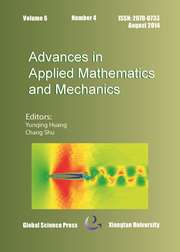Crossref Citations
This article has been cited by the following publications. This list is generated based on data provided by Crossref.
Chen, Huajie
Dai, Xiaoying
Gong, Xingao
He, Lianhua
and
Zhou, Aihui
2014.
Adaptive Finite Element Approximations for Kohn--Sham Models.
Multiscale Modeling & Simulation,
Vol. 12,
Issue. 4,
p.
1828.
2016.
Finite Element Methods for Eigenvalue Problems.
p.
173.
Hong, Qichen
Xie, Hehu
and
Xu, Fei
2018.
A Multilevel Correction Type of Adaptive Finite Element Method for Eigenvalue Problems.
SIAM Journal on Scientific Computing,
Vol. 40,
Issue. 6,
p.
A4208.
Lu, Zuliang
Huang, Fei
Wu, Xiankui
Li, Lin
and
Liu, Shang
2020.
Convergence and quasi-optimality of <inline-formula><tex-math id="M1">$ L^2- $</tex-math></inline-formula>norms based an adaptive finite element method for nonlinear optimal control problems.
Electronic Research Archive,
Vol. 28,
Issue. 4,
p.
1459.
Xu, Fei
Huang, Qiumei
Wang, Min
and
Ma, Hongkun
2020.
A novel adaptive finite element method for the ground state solution of Bose-Einstein condensates.
Applied Mathematics and Computation,
Vol. 385,
Issue. ,
p.
125404.
Yang, Bin
and
Zhou, Aihui
2021.
Eigenfunction behavior and adaptive finite element approximations of nonlinear eigenvalue problems in quantum physics.
ESAIM: Mathematical Modelling and Numerical Analysis,
Vol. 55,
Issue. 1,
p.
209.
Dusson, Geneviève
and
Maday, Yvon
2023.
An overview of a posteriori error estimation and post-processing methods for nonlinear eigenvalue problems.
Journal of Computational Physics,
Vol. 491,
Issue. ,
p.
112352.
Dai, Xiaoying
and
Zhou, Aihui
2023.
Density Functional Theory.
p.
447.
Henning, Patrick
and
Yadav, Mahima
2024.
On discrete ground states of rotating Bose–Einstein condensates.
Mathematics of Computation,
Vol. 94,
Issue. 351,
p.
1.
Yang, Lin
Li, Xiang-Gui
Yan, Wei
and
Zhang, Ran
2025.
The energy-diminishing weak Galerkin finite element method for the computation of ground state and excited states in Bose-Einstein condensates.
Journal of Computational Physics,
Vol. 520,
Issue. ,
p.
113497.
Li, Guanglian
Li, Jing
Merten, Julie
Xu, Yifeng
and
Zhu, Shengfeng
2025.
Adaptive Finite Element Approximations of the First Eigenpair Associated with \({p}\)-Laplacian.
SIAM Journal on Scientific Computing,
Vol. 47,
Issue. 1,
p.
A374.
Henning, Patrick
and
Yadav, Mahima
2025.
Convergence of a Riemannian gradient method for the Gross–Pitaevskii energy functional in a rotating frame.
ESAIM: Mathematical Modelling and Numerical Analysis,
Vol. 59,
Issue. 2,
p.
1145.
Ai, Yueshan
Henning, Patrick
Yadav, Mahima
and
Yuan, Sitong
2026.
Riemannian conjugate Sobolev gradients and their application to compute ground states of BECs.
Journal of Computational and Applied Mathematics,
Vol. 473,
Issue. ,
p.
116866.

